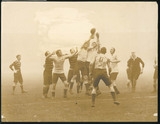
Rugby union at the 1908 Summer Olympics
Encyclopedia
Rugby union at the 1908 Summer Olympics. The event was summarised under the "Football" heading along with association football
. The host Great Britain was represented by Cornwall, the 1908 county champion. Defending Olympic champions France
withdrew, leaving Australasia
, represented by the Australia national rugby union team
as the only other remaining entrant.
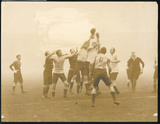 The visiting team competed in the London Olympics in conjunction with the inaugural Wallaby
The visiting team competed in the London Olympics in conjunction with the inaugural Wallaby
tour of the United Kingdom of 1908-09, in which they would ultimately go 25-5-1 in their 31 matches. The Australian team entered the rugby tournament and were the only other team alongside Cornwall, who were representing Great Britain.
Australia had already beaten Cornwall, the British county champions early in the tour - an 18-5 defeat of Cornwall in their third tour match at Camborne RFC
on 3 October 1908. Scotland
and Ireland
had turned down the Rugby Football Union
's invitation to participate in the Olympic bouts. France were expected to contest the medal, but had withdrawn, leaving just the Australia and Cornwall for England team to play for gold and silver medals. The interest in the Olympic rugby final was only lukewarm with the final being held in the last week of Games that had taken place over six months.
In 1908 Twickenham Stadium
was still being built. The match was played at the White City Stadium
, London, on an area alongside the Olympic Games swimming pool which measured 110 yards in length with a long line of netting stretched beside to catch flying balls. Large mattresses were spread along the rim of the pool to prevent injuries to falling players. One day was allocated to what was called the Olympic rugby tournament. The game was rather a damp squib and took place in a thick mid week London fog at a virtually deserted White City. Often a kick for touch saw the ball end up in the pool and it was said that the Australians were more adept at handling the slippery ball.
Penzance RFC and England international winger Barrie Bennetts had to withdraw with an injury in the morning and was replaced by Barney Solomon - the elder brother of the much more famous Bert. Cornwall had 5 current or future England players - captain John Jackett of Falmouth at full back, Bert Solomon at centre, England and British Lions
fly-half John "Maffer" Davey at fly half who partnered St Ives and England scrum half, Tommy Wedge. The pack which scrummaged on a first up/first down principle in those days included another England man A. J. Wilson who was a student at Camborne School of Mines
.
Australia outscored Great Britain six tries to one to win the gold medal with a 32-3 victory. Silver was awarded to Cornwall and no bronze was awarded. The Cornish silver olympic medal was 'drawn for' by the players and won by Thomas 'Chicky' Wedge and it has been on display at the St Ives
RFC clubhouse ever since. After the match the Cornish
players were 'entertained to dinner' by the Cornish Members of Parliament.
Zavos quotes a contemporary newspaper account by Major Trevor in The Daily Telegraph
27Oct1908, "It will be remembered that less than a month ago there was a match played between Australia and Cornwall at Camborne and although the Australians also won on that occasion, the beaten side then played on the whole, a very good game. Yesterday the champion England county was practically at full strength, but from start to finish they were outplayed. The methods by which this victory was gained were even more creditable to the winners than the completeness of the victory itself and it is only fair to the Australians to speak of their play in terms of unqualified praise. The ground was very slippery and very heavy and as a result of several hours of continuous rain the ball was very greasy. The excellence of the play of the Australian backs therefore surprised the spectators. They gave a display of football which would have done credit to a Welsh international side, at its best. They scored eight tries and so good was the play leading up to each of them that it would be hard to say which was the best."


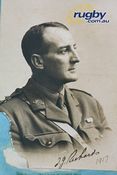
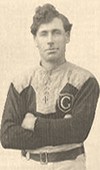
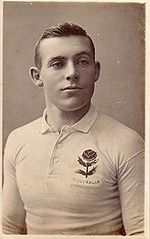
to play the Barbarians
at Wembley Stadium
on 6 December 2008. The proposed match would form part of the BOA's programme of events to celebrate the centenary of the first London Olympic Games.
Football (soccer)
Association football, more commonly known as football or soccer, is a sport played between two teams of eleven players with a spherical ball...
. The host Great Britain was represented by Cornwall, the 1908 county champion. Defending Olympic champions France
France national rugby union team
The France national rugby union team represents France in rugby union. They compete annually against England, Ireland, Italy, Scotland and Wales in the Six Nations Championship. They have won the championship outright sixteen times, shared it a further eight times, and have completed nine grand slams...
withdrew, leaving Australasia
Australasia at the 1908 Summer Olympics
Australasia was the name of a combined team from Australia and New Zealand that competed at the 1908 Summer Olympics in London, England. It was the fourth appearance of Australia, which had not missed any edition of the Summer Olympic Games, and the first appearance of New Zealand...
, represented by the Australia national rugby union team
Australia national rugby union team
The Australian national rugby union team is the representative side of Australia in rugby union. The national team is nicknamed the Wallabies and competes annually with New Zealand and South Africa in the Tri-Nations Series, in which they also contest the Bledisloe Cup with New Zealand and the...
as the only other remaining entrant.
History of 1908 match

Australia national rugby union team
The Australian national rugby union team is the representative side of Australia in rugby union. The national team is nicknamed the Wallabies and competes annually with New Zealand and South Africa in the Tri-Nations Series, in which they also contest the Bledisloe Cup with New Zealand and the...
tour of the United Kingdom of 1908-09, in which they would ultimately go 25-5-1 in their 31 matches. The Australian team entered the rugby tournament and were the only other team alongside Cornwall, who were representing Great Britain.
Australia had already beaten Cornwall, the British county champions early in the tour - an 18-5 defeat of Cornwall in their third tour match at Camborne RFC
Camborne RFC
Camborne RFC were established in 1878, and are one of the most famous rugby union clubs in Cornwall. They currently play in the Western Counties West division and their club colours are Cherry and White...
on 3 October 1908. Scotland
Scottish Rugby Union
The Scottish Rugby Union is the governing body of rugby union in Scotland. It is the second oldest Rugby Union, having been founded in 1873, as the Scottish Football Union.-History:...
and Ireland
Irish Rugby Football Union
The Irish Rugby Football Union is the body managing rugby union in Ireland. The IRFU has its head office at 10/12 Lansdowne Road and home ground at Aviva Stadium, where Irish rugby union international matches are played...
had turned down the Rugby Football Union
Rugby Football Union
The Rugby Football Union was founded in 1871 as the governing body for the sport of rugby union, and performed as the international governing body prior to the formation of the International Rugby Board in 1886...
's invitation to participate in the Olympic bouts. France were expected to contest the medal, but had withdrawn, leaving just the Australia and Cornwall for England team to play for gold and silver medals. The interest in the Olympic rugby final was only lukewarm with the final being held in the last week of Games that had taken place over six months.
In 1908 Twickenham Stadium
Twickenham Stadium
Twickenham Stadium is a stadium located in Twickenham, in the London Borough of Richmond upon Thames. It is the largest rugby union stadium in the United Kingdom and has recently been enlarged to seat 82,000...
was still being built. The match was played at the White City Stadium
White City Stadium
White City Stadium was built in White City, London, for the 1908 Summer Olympics, often seen as the precursor to the modern seater stadium and noted for hosting the finish of the first modern distance marathon. It also hosted speedway and a match at the 1966 World Cup, before the stadium was...
, London, on an area alongside the Olympic Games swimming pool which measured 110 yards in length with a long line of netting stretched beside to catch flying balls. Large mattresses were spread along the rim of the pool to prevent injuries to falling players. One day was allocated to what was called the Olympic rugby tournament. The game was rather a damp squib and took place in a thick mid week London fog at a virtually deserted White City. Often a kick for touch saw the ball end up in the pool and it was said that the Australians were more adept at handling the slippery ball.
Penzance RFC and England international winger Barrie Bennetts had to withdraw with an injury in the morning and was replaced by Barney Solomon - the elder brother of the much more famous Bert. Cornwall had 5 current or future England players - captain John Jackett of Falmouth at full back, Bert Solomon at centre, England and British Lions
British and Irish Lions
The British and Irish Lions is a rugby union team made up of players from England, Scotland, Ireland and Wales...
fly-half John "Maffer" Davey at fly half who partnered St Ives and England scrum half, Tommy Wedge. The pack which scrummaged on a first up/first down principle in those days included another England man A. J. Wilson who was a student at Camborne School of Mines
Camborne School of Mines
The Camborne School of Mines , commonly abbreviated to CSM, was founded in 1888. It is now a specialist department of the University of Exeter. Its research and teaching is related to the understanding and management of the Earth's natural processes, resources and the environment...
.
Australia outscored Great Britain six tries to one to win the gold medal with a 32-3 victory. Silver was awarded to Cornwall and no bronze was awarded. The Cornish silver olympic medal was 'drawn for' by the players and won by Thomas 'Chicky' Wedge and it has been on display at the St Ives
St Ives, Cornwall
St Ives is a seaside town, civil parish and port in Cornwall, England, United Kingdom. The town lies north of Penzance and west of Camborne on the coast of the Celtic Sea. In former times it was commercially dependent on fishing. The decline in fishing, however, caused a shift in commercial...
RFC clubhouse ever since. After the match the Cornish
Cornish people
The Cornish are a people associated with Cornwall, a county and Duchy in the south-west of the United Kingdom that is seen in some respects as distinct from England, having more in common with the other Celtic parts of the United Kingdom such as Wales, as well as with other Celtic nations in Europe...
players were 'entertained to dinner' by the Cornish Members of Parliament.
Zavos quotes a contemporary newspaper account by Major Trevor in The Daily Telegraph
The Daily Telegraph
The Daily Telegraph is a daily morning broadsheet newspaper distributed throughout the United Kingdom and internationally. The newspaper was founded by Arthur B...
27Oct1908, "It will be remembered that less than a month ago there was a match played between Australia and Cornwall at Camborne and although the Australians also won on that occasion, the beaten side then played on the whole, a very good game. Yesterday the champion England county was practically at full strength, but from start to finish they were outplayed. The methods by which this victory was gained were even more creditable to the winners than the completeness of the victory itself and it is only fair to the Australians to speak of their play in terms of unqualified praise. The ground was very slippery and very heavy and as a result of several hours of continuous rain the ball was very greasy. The excellence of the play of the Australian backs therefore surprised the spectators. They gave a display of football which would have done credit to a Welsh international side, at its best. They scored eight tries and so good was the play leading up to each of them that it would be hard to say which was the best."
Medal table
| Rugby union | none |
Australasia (Australia)





| Position | Name |
|---|---|
| Back | Phil Carmichael Phil Carmichael Philip Patrick "Phil" Carmichael was a rugby union player who represented Australia. He won a gold medal in rugby at the 1908 Summer Olympics.... |
| ¾-backs | Charles Russell |
| Daniel Carroll | |
| John Hickey | |
| Frank Smith Frank Smith (rugby player) Francis Bede "Frank" Smith was an Australian rugby union player who competed in the 1908 Summer Olympics. Smith, a centre, was born in Wellington, New South Wales and claimed a total of 4 international rugby caps for Australia... |
|
| Halfbacks | Christopher McKivatt |
| Arthur McCabe Arthur McCabe Arthur John Michael McCabe was a pioneer Australian rugby union and rugby league player. He represented for Australian in rugby union at the 1908 Summer Olympics.-Rugby union career:... |
|
| Forwards | Thomas Griffen Thomas Griffen Thomas Sydney Griffen was an Australian rugby union player who competed in the 1908 Summer Olympics. Griffin, a hooker, was born in Sydney, New South Wales and claimed a total of 6 international rugby caps for Australia.... |
| Jumbo Barnett | |
| Patrick McCue Patrick McCue Patrick Aloysius "Paddy" McCue was an Australian representative rugby union player and pioneer rugby league player... |
|
| Sydney Middleton Sydney Middleton Sydney Albert 'Syd' Middleton DSO, OBE was an Australian Army officer and national representative rugby union player and rower. He won a gold medal in rugby at the 1908 Summer Olympics and competed in rowing at the 1912 Summer Olympics. He had a distinguished career in World War I being awarded... |
|
| Tom Richards | |
| Malcolm McArthur Malcolm McArthur Malcolm J. "Mannie" McArthur was an Australian rugby union national representative rugby union player. He won a gold medal in rugby at the 1908 Summer Olympics.-Rugby career:... |
|
| Charles McMurtrie Charles McMurtrie Charles H. McMurtrie was a pioneer Australian rugby union and rugby league footballer who represented his country at both sports... |
|
| Robert Craig |
Great Britain (Cornwall)
| Position | Name |
|---|---|
| Back | Edward Jackett Edward Jackett Edward John Jackett was an English rugby union player, who represented the England national rugby union team and the British Isles and competed in the 1908 Summer Olympics... |
| ¾-backs | Barney Solomon Barney Solomon John Charles "Barney" Solomon was a Cornish rugby union player who competed as captain for Great Britain in the 1908 Summer Olympics at White City Stadium, London. He also played for Redruth R.F.C..... |
| Bert Solomon Bert Solomon Bert Solomon was a Cornish rugby union player who competed in the 1908 Summer Olympics at White City Stadium, London. He also played for Redruth R.F.C. and 26 times for Cornwall.... |
|
| L. F. Dean L. F. Dean L. F. Dean was a Cornish rugby union player who competed in the 1908 Summer Olympics at White City Stadium, London. He also played for Plymouth Albion R.F.C..... |
|
| J. T. Jose J. T. Jose James Trick "Jimmy" Jose was a Cornish rugby union player who competed in the 1908 Summer Olympics at White City Stadium, London. He also played for Plymouth Albion R.F.C. and Falmouth RFC.... |
|
| Halfbacks | Thomas Wedge Thomas Wedge (rugby player) Thomas Grenfell Wedge was a British rugby union player who competed in the 1908 Summer Olympics.He was a member of the British rugby union team, which won the silver medal.-External links:*... |
| James Davey James Davey James "Maffer" Davey was a British rugby union player who competed in the 1908 Summer Olympics.... |
|
| Forwards | Richard Jackett Richard Jackett Richard Jackett was a Cornish rugby union player who competed in the 1908 Summer Olympics at White City Stadium, London. He also played for Falmouth RFC and 71 times for Cornwall.... |
| E. J. Jones E. J. Jones E. J. Jones was a Cornish rugby union player who competed in the 1908 Summer Olympics at White City Stadium, London. He also played for Plymouth Albion R.F.C. and 18 times for Cornwall.... |
|
| Arthur Wilson Arthur Wilson (rugby player) Arthur James Wilson was a British rugby union player who competed in the 1908 Summer Olympics and represented the England national team.He was a member of the British rugby union team, which won the silver medal.... |
|
| Nicholas Tregurtha Nicholas Tregurtha Nicholas Jacob Tregurtha was a British rugby union player who competed in the 1908 Summer Olympics.He was a member of the British rugby union team, which won the silver medal.-External links:*... |
|
| A. Lawrey A. Lawrey A. Lawrey was a Cornish rugby union player who competed in the 1908 Summer Olympics at White City Stadium, London. He also played for Redruth R.F.C. and 15 times for Cornwall. He was a member of the British rugby union team, which on 26 October 1908 won the Olympic silver medal for Great... |
|
| C. R. Marshall C. R. Marshall C. R. Marshall was a British rugby union player who competed in the 1908 Summer Olympics.He was a member of the British rugby union team, which won the silver medal.-External links:*... |
|
| A. Wilcocks A. Wilcocks A. Wilcocks was a Cornish rugby union player who competed in the 1908 Summer Olympics at White City Stadium, London. He also played for Plymouth Albion R.F.C. and 14 times for Cornwall.... |
|
| John Trevaskis John Trevaskis John Trevaskis was a Cornish rugby union player who competed in the 1908 Summer Olympics at White City Stadium, London. He also played for St Ives RFC and 10 times for Cornwall.... |
Centenary celebration matches
Two centenary matches are planned to take place in Cornwall to celebrate the 1908 Olympic final - a Cornwall v Southern Hemisphere players match and another high-level prestige match involving Cornwall. Australia have also been approached by the British Olympic AssociationBritish Olympic Association
The British Olympic Association is the national Olympic committee for Great Britain and Northern Ireland. It was formed in 1905 in the House of Commons, and at that time consisted of seven national governing body members from the following sports: fencing, life-saving, cycling, skating, rowing,...
to play the Barbarians
Barbarian F.C.
The Barbarian Football Club, usually referred to as the Barbarians and nicknamed the "Baa-Baas", is an invitational rugby union team based in Britain...
at Wembley Stadium
Wembley Stadium
The original Wembley Stadium, officially known as the Empire Stadium, was a football stadium in Wembley, a suburb of north-west London, standing on the site now occupied by the new Wembley Stadium that opened in 2007...
on 6 December 2008. The proposed match would form part of the BOA's programme of events to celebrate the centenary of the first London Olympic Games.

